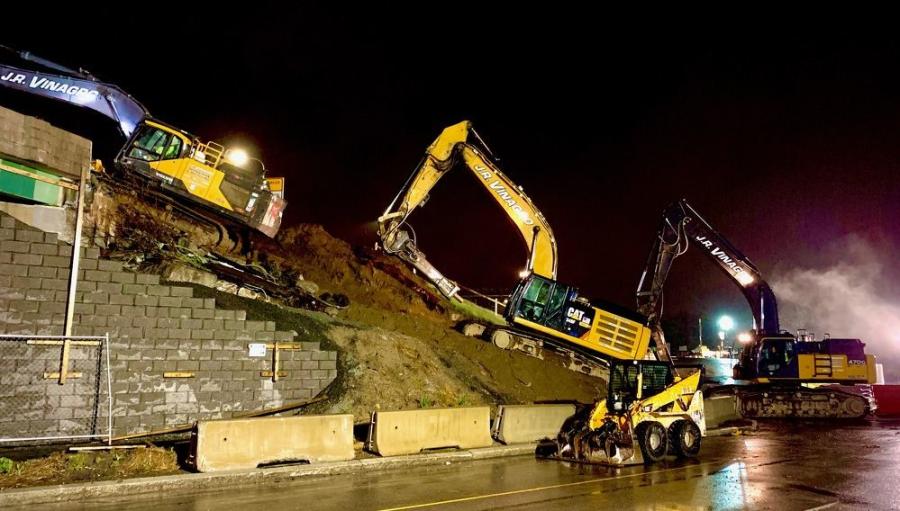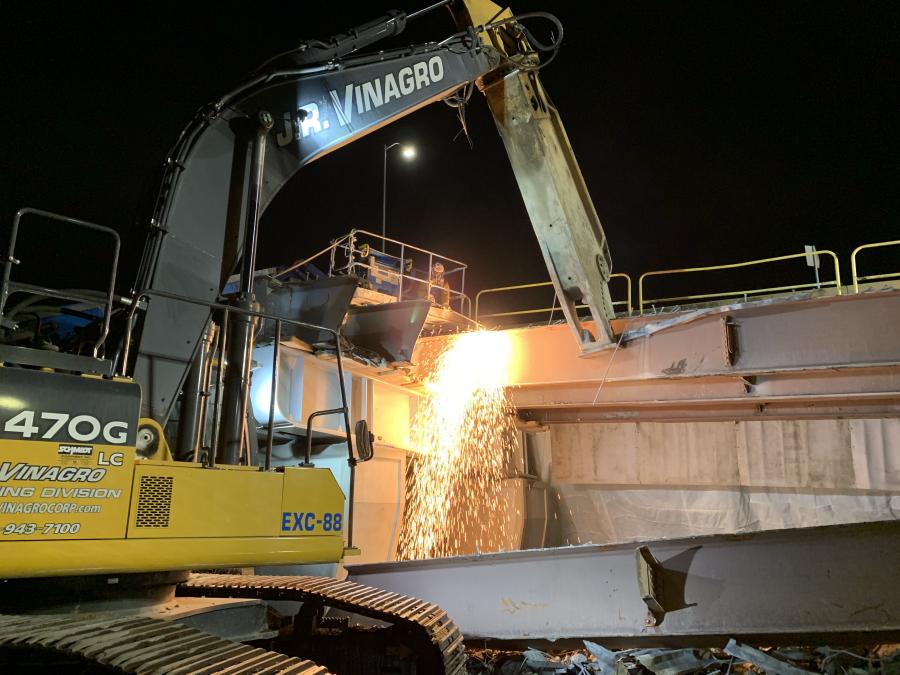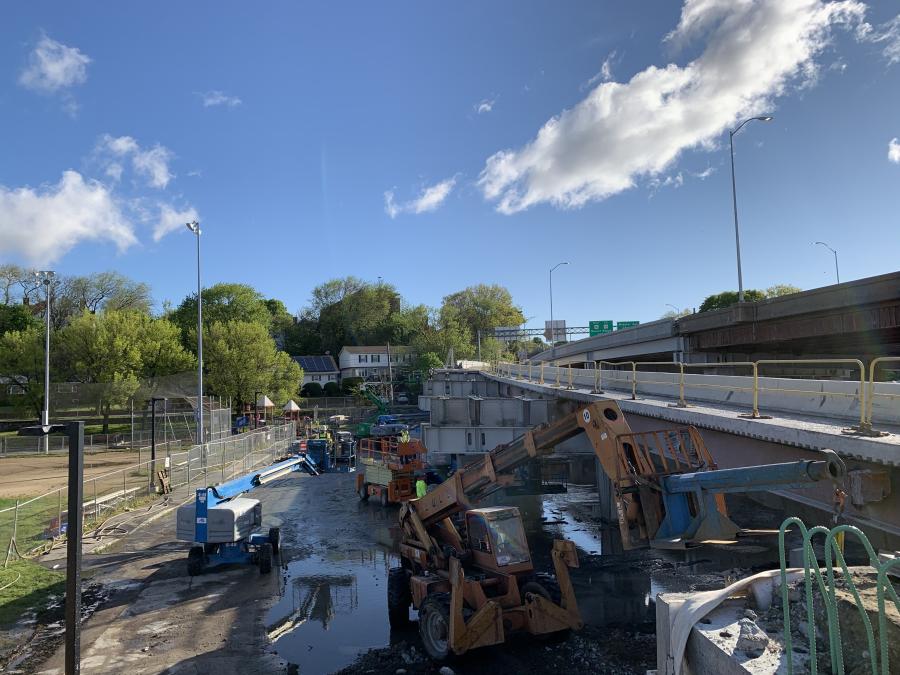Boston’s reopening plan is working in tandem with the Commonwealth of Massachusetts Reopening Massachusetts plan.
Construction is an important part of Boston's economy and the city employs thousands of people on large, medium and small projects year-round.
Back on May 5, the city had announced its plan to loosen the COVID-19 restrictions — a plan that would lead to the gradual re-opening of construction and on May 18 it followed through on that decision.
The goal is to re-open construction on a wider scale in wake of the pandemic, and general contractors and subcontractors are pleased that a way forward is being initiated toward a return to normal.
Boston's plan is working in tandem with the Commonwealth of Massachusetts Reopening Massachusetts plan. During a May 19 press conference, Boston Mayor Marty Walsh stressed the importance of construction and the need to-open.
"I want to be clear about how Boston is moving forward on major industries and issues in our city, he said. "As of yesterday [May18], the state plan allows construction to restart. In Boston, we have a phased-in approach with comprehensive health and safety requirements. Work on schools, hospitals, smaller residential projects and open-air construction can restart this week, while other work allowed by the state may resume Tuesday, May 26. In every case, we're requiring contractors to submit a COVID-19 Safety Plan before returning to work. To help sites meet this requirement, we have hosted virtual safety planning, as well as safety training for inspectors. We have produced a video guide along with other reference materials.
"Already, we've had nearly 2,300 safety plans submitted, we've trained all our inspectional staff and supplied them with personal protective equipment," he added. "This plan is a good example of how we are approaching the challenge of a safe reopening. We acted early, with a construction pause to keep workers safe. We researched the special public health challenges in the industry. We engaged the employers and the workforce around their needs and challenges. We developed a phased-in plan, with guidelines and resources for a safe return and continual communication."
The announcement on the city's Web page was equally clear: "After May 25, the city will permit any construction type that is allowed by the state, with the required COVID-19 Safety Affidavits and COVID-19 Safety Plans for permitted construction work in place."
It also provided some background on the situation: "On May 5, the city activated the submission process for required COVID-19 Safety Affidavits and COVID-19 Safety Plans for permitted construction work. The city also announced the timeline to incrementally expand the categories of allowed construction to further align with the broader categories of construction defined as essential by the state."
The goal is to incrementally expand construction work permitted in Boston to align with the state's list of allowed construction work.
Prior to May 18, only essential work was permitted due to the health crisis, which included:
- emergency utility, road or building work, such as gas leaks, water leaks and sinkholes;
- new utility connections to occupied buildings;
- mandated building or utility work;
- work at public health facilities, healthcare facilities, shelters, including temporary shelters and other facilities that support vulnerable populations;
- emergency work necessary to render occupied residential buildings safe and healthy;
- work immediately necessary related to life safety systems;
- work that ensures the reliability of the transportation network;
- small residential construction projects in dwellings of three units or fewer (for example, kitchen or bathroom remodeling); and
- other work necessary to render occupied residential buildings fully habitable.
In effect, along with state guidelines, many large projects that employed thousands of construction workers were deemed to be non-essential and thus shut down. This led to temporary layoffs and delays on projects that will have to be made up with work on weekend and at night, should permission be granted, to get back on schedule and meet delivery dates.
A crucial element of the transition for the return to normal was during the week from May 18 to May 25 when the city allowed essential construction, as defined by the state, that meet the following criteria: projects that are in compliance with and have filed a COVID-19 Safety Plan and signed an affidavit; that project sites are sufficiently prepared to adhere to all criteria of their safety plan; and the work is for hospitals, public schools, residential buildings (one to three units), road and utility work, or other outdoor or open-air work, such as steel erection, roofing, and construction foundations.
This definitely opened the door for many road, bridge and infrastructure projects to resume. J.R. Vinagro Corp., a demolition firm, has six ongoing projects in the Greater Boston Area, including the Massachusetts Department of Transportation's Chelsea Viaduct reconstruction and demolition projects in Dorchester and Roxbury.
"The restrictions haven't affected us, but they have affected companies that we have worked with for many years," said Jeremy Souza, J.R. Vinagro's operations manager, Heavy Civil Division. "We haven't slowed down during the virus outbreak. The loosening of restrictions is long overdue as we have precautions in place to protect people and people should be back at work. Everyone is pretty excited to return to their job sites, but the city's plan is still kind of vague on the work that can resume — when it can restart and how to reopen sites where non-essential projects were suspended."
Souza believes the public desire to have life return to normal as much as possible will influence how the state further loosens restrictions on construction.
"People are less precautionary than they were a month ago and are expressing their desire to go back to pre-COVID routines faster than the state will allow them to," he said. "The more the public sends this message, the more the state will reply in kind for the restoration of economic activity."
Souza understands fully how many general contractors and subcontractors are hurting and are doing their best to support their employeess.
"Some companies are trying their best to keep loyal and more essential employees on the books and working, which is hard to do when the money in not coming in," he said. "And by the same token, we have construction workers that are looking for work, but can't find jobs because of the state's restrictions. Some have been forced to go to other companies that they normally wouldn't work with just to support their families. They have no choice but to outsource their skills to somebody else."
W.L. French Corporation's projects in the Greater Boston area were suspended due to the COVID-19 restrictions, and the firm is eager to have its crews return to their work sites.
"We believe that a lot of our peers, who have a significant amount of their work in and around the Boston region area, are dealing with similar issues," said Bill French, Jr., president, W. L. French Excavating Corporation. "The [city's] plan that has been released was done so with caution based on facts. We do not envy the decisions being made by our state and local administrations, however we are excited to get back to work."
Tim Hunt, W.L. French's director of environmental health & safety, noted that his firm has learned the lessons of the pandemic and is applying them.
"This experience has reaffirmed that each company out on a job site is really all part of one team," he said. "The job site is the team and only through working together and recognizing each other's particular needs, can the project be safely built. Pre-planning has never been more important. Scheduling site activities is now an art with the distancing requirements in place.
"Should another wave of this pandemic hit," he added, "the construction industry should be able to stay the course. As long as everyone on site is doing their part with distancing, protective measures and hygiene; there shouldn't be a path for the virus to continue its spread." CEG
Irwin Rapoport
A journalist who started his career at a weekly community newspaper, Irwin Rapoport has written about construction and architecture for more than 15 years, as well as a variety of other subjects, such as recycling, environmental issues, business supply chains, property development, pulp and paper, agriculture, solar power and energy, and education. Getting the story right and illustrating the hard work and professionalism that goes into completing road, bridge, and building projects is important to him. A key element of his construction articles is to provide readers with an opportunity to see how general contractors and departments of transportation complete their projects and address challenges so that lessons learned can be shared with a wider audience.
Rapoport has a BA in History and a Minor in Political Science from Concordia University. His hobbies include hiking, birding, cycling, reading, going to concerts and plays, hanging out with friends and family, and architecture. He is keen to one day write an MA thesis on military and economic planning by the Great Powers prior to the start of the First World War.
Read more from Irwin Rapoport here.
Today's top stories
















